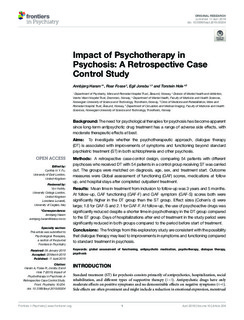| dc.contributor.author | Haram, Annbjørg | |
| dc.contributor.author | Fosse, Roar | |
| dc.contributor.author | Jonsbu, Egil | |
| dc.contributor.author | Hole, Torstein | |
| dc.date.accessioned | 2020-02-14T07:22:07Z | |
| dc.date.available | 2020-02-14T07:22:07Z | |
| dc.date.created | 2019-10-30T10:46:32Z | |
| dc.date.issued | 2019 | |
| dc.identifier.citation | Frontiers in Psychiatry. 2019, 10 | nb_NO |
| dc.identifier.issn | 1664-0640 | |
| dc.identifier.uri | http://hdl.handle.net/11250/2641652 | |
| dc.description.abstract | Background: The need for psychological therapies for psychosis has become apparent since long-term antipsychotic drug treatment has a range of adverse side effects, with moderate therapeutic effects at best.
Aims: To investigate whether the psychotherapeutic approach, dialogue therapy (DT) is associated with improvements of symptoms and functioning beyond standard psychiatric treatment (ST) in both schizophrenia and other psychosis.
Methods: A retrospective case-control design, comparing 54 patients with different psychoses who received DT with 54 patients in a control group receiving ST was carried out. The groups were matched on diagnosis, age, sex, and treatment start. Outcome measures were Global assessment of functioning (GAF) scores, medications at follow up, and hospital stays after completed outpatient treatment.
Results: Mean time in treatment from inclusion to follow-up was 3 years and 5 months. At follow-up, GAF functioning (GAF-F) and GAF symptom (GAF-S) scores both were significantly higher in the DT group than the ST group. Effect sizes (Cohen's d) were large; 1.8 for GAF-S and 2.1 for GAF-F. At follow-up, the use of psychoactive drugs was significantly reduced despite a shorter time in psychotherapy in the DT group compared to the ST group. Days of hospitalizations after end of treatment in the study period were significantly reduced in both groups compared to the period before start of treatment.
Conclusions: The findings from this exploratory study are consistent with the possibility that dialogue therapy may lead to improvements in symptoms and functioning compared to standard treatment in psychosis. | nb_NO |
| dc.language.iso | eng | nb_NO |
| dc.publisher | Frontiers Media | nb_NO |
| dc.rights | Navngivelse 4.0 Internasjonal | * |
| dc.rights.uri | http://creativecommons.org/licenses/by/4.0/deed.no | * |
| dc.title | Impact of psychotherapy in psychosis: A retrospective case control study | nb_NO |
| dc.type | Journal article | nb_NO |
| dc.type | Peer reviewed | nb_NO |
| dc.description.version | publishedVersion | nb_NO |
| dc.source.volume | 10 | nb_NO |
| dc.source.journal | Frontiers in Psychiatry | nb_NO |
| dc.identifier.doi | 10.3389/fpsyt.2019.00204 | |
| dc.identifier.cristin | 1742068 | |
| dc.description.localcode | Copyright © 2019 Haram, Fosse, Jonsbu and Hole. This is an open-access article distributed under the terms of the Creative Commons Attribution License (CC BY). The use, distribution or reproduction in other forums is permitted, provided the original author(s) and the copyright owner(s) are credited and that the original publication in this journal is cited, in accordance with accepted academic practice. No use, distribution or reproduction is permitted which does not comply with these terms. | nb_NO |
| cristin.unitcode | 194,65,35,0 | |
| cristin.unitcode | 194,65,25,0 | |
| cristin.unitname | Institutt for psykisk helse | |
| cristin.unitname | Institutt for sirkulasjon og bildediagnostikk | |
| cristin.ispublished | true | |
| cristin.fulltext | original | |
| cristin.qualitycode | 1 | |

